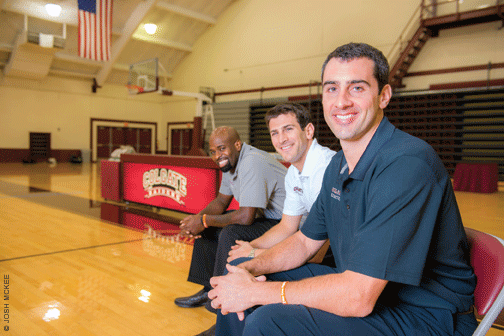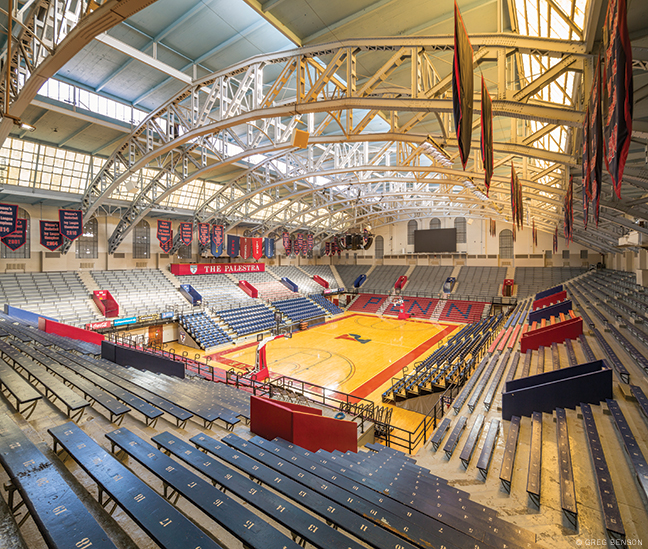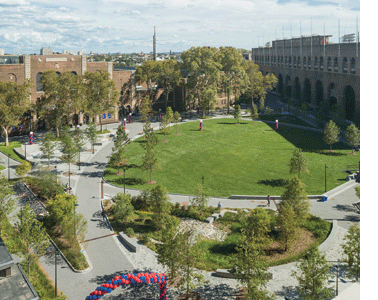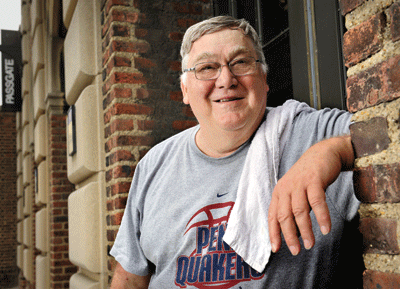
When Matt Langel W’00 was a senior at Moorestown High School in New Jersey, he didn’t know much about Mike Jordan C’00, other than the fact that they were both committed to play basketball at Penn. So he was surprised when, between games of a high school basketball tournament in Langel’s home state, Jordan approached him out of the blue to say that he was rooting for him.
“That’s something I’ve always remembered,” Langel says. “It was important enough for him to cheer on his future teammate—a guy he didn’t know at all.”
That would turn out to be the start of a special friendship. At Penn, they lived together and did intramurals together. They played video games and went to pro wrestling matches. Langel’s mother brought Jordan homemade taco salads. Jordan welcomed Langel at barbeques on his block in Philadelphia’s Germantown neighborhood, where they ate burgers and ribs and played the neighborhood guys in hoops.
Of course, their best basketball games were saved for the Palestra. With the playmaking Jordan running the point and the sharpshooting Langel knocking down three-pointers, the Quakers ended Princeton’s three-year reign to capture Ivy League championships in 1999 and 2000, their final two years in school.
“I would say he’s like my brother,” says Jordan, who scored 1,604 career points at Penn, the fifth-highest total in program history. “We just hit it off from the start. His family accepted me. My family accepted him. It’s just a bond I don’t think anyone will be able to break.”
And it’s a bond that recently got even stronger. On August 1, the two were reunited when Langel, now the head basketball coach at Colgate University, hired Jordan to be one of his assistants. Interestingly enough, another one of their former Penn teammates, Dave Klatsky W’03, is also on the staff.
“It’s comfortable,” says Langel, who took over the Colgate program last year after spending seven seasons as an assistant under former Quakers basketball coach Fran Dunphy, first at Penn and then at Temple. “I feel good about who they are as people. In this profession, I learned from Coach Dunphy that you want guys you can really trust.”
For Jordan, having two ex-teammates by his side has already proved invaluable. The 1999-2000 Ivy League Player of the Year enjoyed plenty of success on the hardwood during a long professional career overseas that just wrapped up last year, but he recognizes that he has a lot to learn as he transitions into the next phase of his basketball life. There are other adjustments for the Philly native, too—like living in rural Hamilton, New York, where he sees deer and turkey in his front yard every morning.
One of the things Jordan doesn’t need to be taught is how to bring competitiveness and toughness to a Colgate basketball program that hasn’t won a conference championship since 1996. In fact, that’s something Jordan taught Langel and Klatsky back when they all played at Penn. As a freshman on the Quakers’ 1999-2000 squad, Klatsky was the first guard to come off the bench, often subbing for Jordan or Langel. But he never felt any pressure in that role, mainly because the toughest player he went up against wasn’t anyone from Princeton, Kansas, or Kentucky; it was Jordan. According to Langel, Jordan “tried to destroy Dave every chance he got” in practice.
Those brutal lessons would come in handy for Klatsky, who became the starting point guard in 2000-01 and the sixth man on Penn’s title-winning teams in 2002 and 2003. He then went to work in finance in New York before beginning his coaching career at Division III Stevens Institute of Technology in 2007 and joining Langel at Colgate four years later. Reuniting with Langel was an easy decision for Klatsky, who remembers his former teammate as a coach in the making.
“There are very few guys in life I respect more than Matt, and that came across right away when he was a senior,” Klatsky says. “He basically was the role model. If he was doing something, you knew that’s how it should be done. Mike, on the other hand, was just so competitive and such a good player that I learned so much from him on the court. It’s funny, I realize now from watching him coach how much I stole from him as a player—and now as a coach.”
Now, some 250 miles from the Palestra and a decade removed from their college playing days, the three ex-Quakers are still able to get out on the court together, sometimes taking on the Colgate players in drills and scrimmages. That part of the job is especially rewarding for Jordan, who misses being a pro ballplayer in Europe (except for “the other stuff” that came along with it, like being mismanaged and not getting paychecks on time, he notes).
“For us to tell them something, they’ll look at you like, ‘Yeah, whatever, Coach,’” says Jordan, referring to his players. “But when you get out there on the court and show them that, at 35, you can still get buckets on them, that makes a difference.”
Langel, Jordan, and Klatsky also have a unique understanding of how each of the others likes to play the game, which of course comes from being taught in the same Fran Dunphy school of basketball. That’s already translated into coaching, where they have similar visions of how to turn around a program whose last winning season came in 2007-08. They don’t want to turn Colgate into Penn, but they do want to bring a little bit of that Penn pride to upstate New York. And the three former Quakers have felt the warmth in their new home as their plans for a basketball renaissance are underway. Well, most of the time.
“There are some Ivy jokes here and there,” Klatsky says with a laugh. “But I think people are glad to have us aboard and hope we can make some changes.”
—Dave Zeitlin C’03




